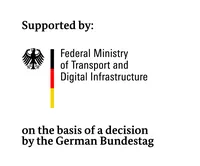RadLast
Potential of Cargo Bikes in City Logistics is analyzed in the project RadLast. The aim of the project is to analyze the potential of cargo bikes as a last-mile means of transportation for parcel delivery. The model is designed as a Commodity Flow Model. Parcel flows arriving in Munich and Regensburg are further disaggregated to delivery tours. For this purpose, fixed or mobile micro depots are implemented to transfer goods from vans to cargo bikes.
We assume a two-stage transportation model: Goods that arrive from outside of the city are delivered to fixed or mobile depots by trucks and from there by cargo bikes to the final customer. To analyze both costs and environmental aspects, the location and size of micro depots are determined based on a mathematical optimization model and tested in different scenarios. Depots could serve either as a warehouse or just as a hub. The number of depots has an impact on the number of cargo bikes. Additionally, the number of depots has an impact on the flexibility of the system. The results can be presented with the decision support tool. The tool will be demonstrated for case studies to explore the potential of cargo bikes. By using the example of Munich and Regensburg, the transferability of the tool will be demonstrated.
The project is funded by the German Federal Ministry of Transport and Digital Infrastructure within the National Cycling Plan 2020 (NRVP).
